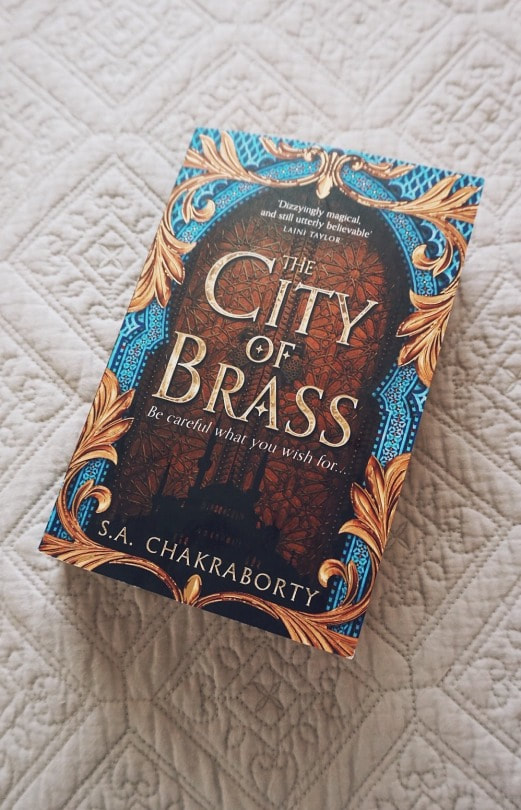City of Brass
Author: S.A. Chakraborty
Published by: Harper Collins
Pages: 534
Format: Paperback
My Rating ★★★★★
In the markets of eighteenth century Cairo, thieves, tricksters, con artists and outcasts eke out a living swindling rich nobles and foreign invaders alike.
But alongside this new world, the old stories linger. Tales of djinn and spirits, of cities hidden among the swirling sands of the desert – full of enchantment, desire and riches – where magic pours down every street, hanging in the air like dust.
Many wish their lives could be filled with wonder, but not Nahri. She knows the trades she uses to get by are just tricks and sleights of hand: there’s nothing magical about her. She only wishes to one day leave Cairo, but as the saying goes…
Be careful what you wish for.
My thoughts:
The City of Brass is unlike any fantasy novel I’ve read before, and I loved it. This debut novel is easily one of the best books I’ve read recently, and I’m so glad I decided to give it a go.It is the first book in a Muslim fantasy series, and the action switches back and forth between two different points of view.
One point of view is a girl in her early twenties, who remembers nothing of her childhood, and is living near Cairo, Egypt. Her name is Nahri and she is a street healer by day, and a con-woman and thief by night. She is a wonderful and highly intelligent character with a great backstory and lots of personality to make her even more interesting as the plot develops. Nahri has a natural skill for healing people, and can magically see what the problem is. These skills enable her to stay alive and earn money as she gets hired to cleanse and heal people throughout Cairo.
The real story truly begins at one of these ceremonies where Nahri is helping to heal someone, and as she does so she really is putting on a good show to get paid at the end of the night. This night, however, things get far more complicated, and she accidentally unlocks some magic beyond her control.
After a turn of events, Nahri ends up in a cemetery where she begins to pray and accidentally summons a daeva warrior from another world. The warrior, Dara, soon realizes that Nahri isn’t entirely human, and that trouble will soon come to both of them. In order to keep them both safe, the daeva leads Nahri to a magical city that is hidden behind brass walls. As we begin to learn more about this city, we are introduced to the second point of view, which comes from a young Prince living in the city, named Ali. In Daevabad Ali’s brother, Muntadhir, is the promised king, and Ali lives in the palace with his family, training to become a more influential role alongside the other royals. Ali will never marry or have children, but will be groomed to serve and protect Muntadhir with his life. He is completely dedicated to God, and cares deeply for his family.
The city of Daevabad is home to all kinds of people. When Nahri decides to enter this world, she learns that true power is fierce and brutal. That magic cannot shield her from the dangerous web of court politics. That even the cleverest of schemes can have deadly consequences.
In this world, the citizens can use magic, including humans, even though there are various ways in which they are able to do so. Even though thisis undoubtedly a fantasy novel, it also ties in with our real world, and this makes humans a key part of this story.
I absolutely lived all the vibrancy and complexity within the walls of the City, and how with all these beings, different powers and abilities are explored. I loved the fantastical elements and the level of detail included by the author created a really vivid fascinating world to get lost in.
At the heart of the book is arguably a story about oppression, and what it means to believe that your blood is more pure than other people’s. This is demonstated again and again in how the mixed bloods in this world, shafits, are treated cruelly and without a second thought. They are killed for crimes they don’t commit, just to make the pure bloods feel safer. They lead extremely different lives to the pure bloods, and suffer on a daily basis. Their children are stolen and sold away, most are forced to work as slaves or pleasure slaves. This story can feel so very real at times and, in my opinion, these themes gave the book so much more depth than I was expecting. It really is very powerful.
I felt the story was fantastic, the characters are wonderful, the prose is exceptional, and the messages and representation within are so important in achieving such an absorbing and unique read. This book is heartfelt and powerful. I can’t wait to get started on the second part of this fantasy trilogy! I found this book such an addictive and highly entertaining read, so of course I’m heading straight out to buy the sequel as soon as possible.
Overall reaction:
Published by: Harper Collins
Pages: 534
Format: Paperback
My Rating ★★★★★
In the markets of eighteenth century Cairo, thieves, tricksters, con artists and outcasts eke out a living swindling rich nobles and foreign invaders alike.
But alongside this new world, the old stories linger. Tales of djinn and spirits, of cities hidden among the swirling sands of the desert – full of enchantment, desire and riches – where magic pours down every street, hanging in the air like dust.
Many wish their lives could be filled with wonder, but not Nahri. She knows the trades she uses to get by are just tricks and sleights of hand: there’s nothing magical about her. She only wishes to one day leave Cairo, but as the saying goes…
Be careful what you wish for.
My thoughts:
The City of Brass is unlike any fantasy novel I’ve read before, and I loved it. This debut novel is easily one of the best books I’ve read recently, and I’m so glad I decided to give it a go.It is the first book in a Muslim fantasy series, and the action switches back and forth between two different points of view.
One point of view is a girl in her early twenties, who remembers nothing of her childhood, and is living near Cairo, Egypt. Her name is Nahri and she is a street healer by day, and a con-woman and thief by night. She is a wonderful and highly intelligent character with a great backstory and lots of personality to make her even more interesting as the plot develops. Nahri has a natural skill for healing people, and can magically see what the problem is. These skills enable her to stay alive and earn money as she gets hired to cleanse and heal people throughout Cairo.
The real story truly begins at one of these ceremonies where Nahri is helping to heal someone, and as she does so she really is putting on a good show to get paid at the end of the night. This night, however, things get far more complicated, and she accidentally unlocks some magic beyond her control.
After a turn of events, Nahri ends up in a cemetery where she begins to pray and accidentally summons a daeva warrior from another world. The warrior, Dara, soon realizes that Nahri isn’t entirely human, and that trouble will soon come to both of them. In order to keep them both safe, the daeva leads Nahri to a magical city that is hidden behind brass walls. As we begin to learn more about this city, we are introduced to the second point of view, which comes from a young Prince living in the city, named Ali. In Daevabad Ali’s brother, Muntadhir, is the promised king, and Ali lives in the palace with his family, training to become a more influential role alongside the other royals. Ali will never marry or have children, but will be groomed to serve and protect Muntadhir with his life. He is completely dedicated to God, and cares deeply for his family.
The city of Daevabad is home to all kinds of people. When Nahri decides to enter this world, she learns that true power is fierce and brutal. That magic cannot shield her from the dangerous web of court politics. That even the cleverest of schemes can have deadly consequences.
In this world, the citizens can use magic, including humans, even though there are various ways in which they are able to do so. Even though thisis undoubtedly a fantasy novel, it also ties in with our real world, and this makes humans a key part of this story.
I absolutely lived all the vibrancy and complexity within the walls of the City, and how with all these beings, different powers and abilities are explored. I loved the fantastical elements and the level of detail included by the author created a really vivid fascinating world to get lost in.
At the heart of the book is arguably a story about oppression, and what it means to believe that your blood is more pure than other people’s. This is demonstated again and again in how the mixed bloods in this world, shafits, are treated cruelly and without a second thought. They are killed for crimes they don’t commit, just to make the pure bloods feel safer. They lead extremely different lives to the pure bloods, and suffer on a daily basis. Their children are stolen and sold away, most are forced to work as slaves or pleasure slaves. This story can feel so very real at times and, in my opinion, these themes gave the book so much more depth than I was expecting. It really is very powerful.
I felt the story was fantastic, the characters are wonderful, the prose is exceptional, and the messages and representation within are so important in achieving such an absorbing and unique read. This book is heartfelt and powerful. I can’t wait to get started on the second part of this fantasy trilogy! I found this book such an addictive and highly entertaining read, so of course I’m heading straight out to buy the sequel as soon as possible.
Overall reaction:


